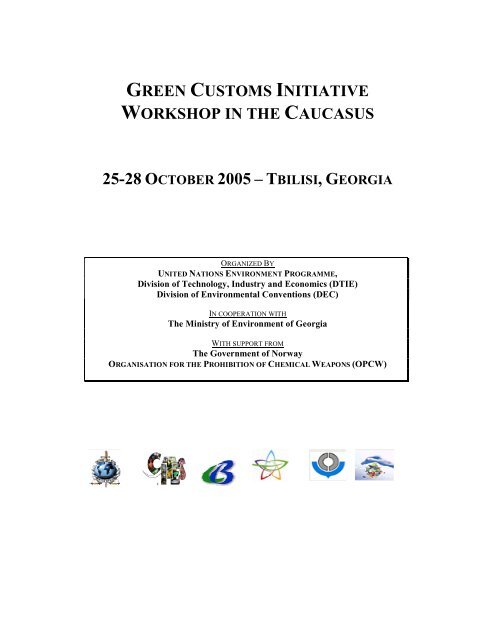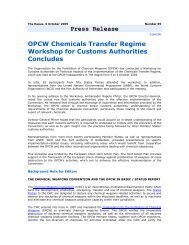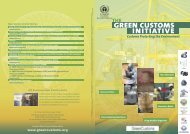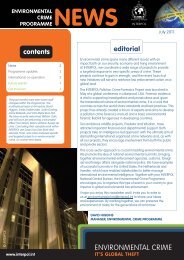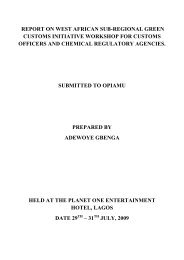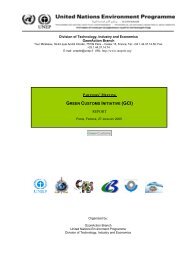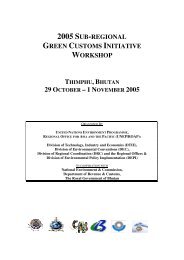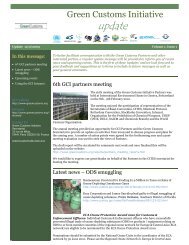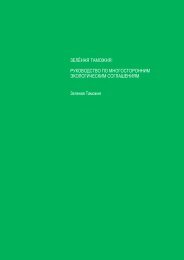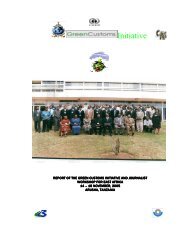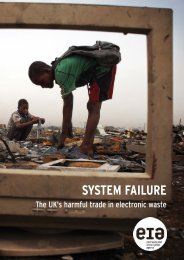Tbilisi - Green Customs Initiative
Tbilisi - Green Customs Initiative
Tbilisi - Green Customs Initiative
Create successful ePaper yourself
Turn your PDF publications into a flip-book with our unique Google optimized e-Paper software.
GREEN CUSTOMS INITIATIVEWORKSHOP IN THE CAUCASUS25-28 OCTOBER 2005 – TBILISI, GEORGIAORGANIZED BYUNITED NATIONS ENVIRONMENT PROGRAMME,Division of Technology, Industry and Economics (DTIE)Division of Environmental Conventions (DEC)IN COOPERATION WITHThe Ministry of Environment of GeorgiaWITH SUPPORT FROMThe Government of NorwayORGANISATION FOR THE PROHIBITION OF CHEMICAL WEAPONS (OPCW)
CONTENTS1 BACKGROUND.........................................................................................................32 OBJECTIVES OF THE WORKSHOP..............................................................................43 PARTNERS...............................................................................................................54 METHODOLOGY ......................................................................................................65 PARTICIPANTS.........................................................................................................66 EXPECTED OUTCOME..............................................................................................77 HIGHLIGHTS OF DISCUSSIONS .................................................................................78 RECOMMENDATIONS FOR THE GREEN CUSTOMS TRAINING GUIDE.......................12ANNEX 1: AGENDA......................................................................................................13ANNEX 2: LIST OF PARTICIPANTS................................................................................172
1 BACKGROUNDEnvironmental crime is a big and increasingly lucrative business – a multi-billiondollar global enterprise. Illegal international trade in “environmentally-sensitive”commodities such as Ozone Depleting Substances (ODSs), toxic chemicals,hazardous wastes and endangered species is an international problem with seriousconsequences: it directly threatens human health and the environment, contributes tospecies loss, and results in revenue loss for governments.Another serious effect of illegal trade in environmentally sensitive commodities isthat it also seriously undermines the effectiveness of Multilateral EnvironmentalAgreements (MEAs) by circumventing rules and procedures agreed in internationaltreaties.National and international regimes for integrated chemical management rely oncustoms to monitor and control flows of regulated chemicals at borders 1 .International agreements related to chemical management often restrict the nationalsupply and demand of specific chemicals and some set incentives for phase out of themost harmful substances. If illegal trade in these chemicals occurs, the incentives setby the MEAs for control and phase out of chemicals are considerably weakened. Inthose countries, which have the appropriate laws or policies already in place, thenational customs authorities must have the capacity to monitor and control the flow ofchemicals and goods covered by MEAs.However, customs agencies operating in isolation are not sufficient. At the nationallevel, customs is but one element of a “compliance and enforcement chain” thatincludes:Clear and enforceable legislation,Authority equipped with an institutional set up (skilled experts in this field)for MEA implementation,Monitoring detection and seizure of illegal shipments by customs agencies,Prosecution of criminal cases involving such shipments by prosecutingattorneys,Appropriate sentencing by the judiciary.Stakeholders will face difficulties in phasing out their consumption ofenvironmentally sensitive commodities, without;Enacting of enforceable legislations,Competent authorities who update them about obligations of MEAs andprovide customs authorities with proper technical and policy advice,Effective detection and seizure by customs,Deterrent punishment to those who have attempted to abuse the legislations.All five individual links in this chain must be strong in order to achieve our goal ofphasing out consumption of environmentally sensitive commodities and to succeed asa whole. In many developing countries these key players suffer from either weaknessor lack linkages amongst themselves (for example; without enacting enforceablelegislations, lack of training of customs officers, legal advisors etc.). As a result this1 This also applies to international regimes protecting endangered species.3
encourages illegal trade that is difficult to control, which in turn makes it difficult tobe in compliance with these MEAs.The <strong>Green</strong> <strong>Customs</strong> <strong>Initiative</strong> aims at strengthening compliance and enforcement ofMEAs through integrated capacity building for customs officers within the MEAenforcement chain. It plans to provide customs officers with training that coversseveral MEAs at the same time, making it more efficient than separate training onindividual agreements.2 OBJECTIVES OF THE WORKSHOPThe main aim of this meeting, organized by UNEP (DTIE & DEC) in cooperationwith the Ministry of Environment of Georgia, and with support provided by theGovernment of Norway and OPCW, was to gather the key stakeholders (customsofficers, customs training institutes, MEA national focal points) of MEAs fromcountries in the Caucasus region to enable them to familiarize themselves with theMEAs (Montreal Protocol, Rotterdam, Stockholm, Basel, CITES and the Conventionfor the Prohibition of Chemical Weapons) and discuss face-to-face the concernedissues, as well as to identify the role of each stakeholder in order to facilitateachieving compliance with the relevant MEAs.The workshop thus aimed at: Creating awareness amongst customs officers on their role in enforcingMEAs Presenting the trade aspects of each of these MEAs and the impact oncustoms officers Presenting the existing international setting for MEA enforcement (includingMEA secretariats) Highlighting interlinkages and possible synergies in enforcement of thevarious MEAs Encouraging bilateral and regional dialogues on trade practices related toMEAs Presenting available resources for customs administration on MEAenforcement issues, particularly amongst international organizationsinvolved in these issues Testing the <strong>Green</strong> <strong>Customs</strong> Training Guide being developed by the partnersso that it can be adapted to the training needs of the national customsadministration Encouraging creation of links at the national level between key MEAenforcement stakeholders: customs officers, customs training institutes,MEA national focal points, judges, prosecutors Discussing possibilities and relevance of expanding the training to focus alsoon judges and prosecutors in the next phase of work Preparing a second phase in which the generic training guide will be adaptedto national training needs.4
3 PARTNERSInternational PartnersThe following international organizations participated in the workshop:Organisation for the Prohibition of Chemical Weapons (OPCW)The World <strong>Customs</strong> Organization’s (WCO) Regional Intelligence LiaisonOffice (RILO) - MoscowU.S. Environmental Protection AgencyDivisions of the United Nations Environment Programmeo Division of Technology, Industry and Economics (UNEP DTIE)o Division of Environmental Conventions (UNEP DEC)Environmental Investigation Agency (EIA) UKMinistry of Environment and Physical Planning, Former Yugoslav Republicof MacedoniaThe Secretariats of the following MEAs were not represented but provided materialand guidance for the workshop sessions:Basel Convention on the Control of Transboundary Movements ofHazardous Wastes and their DisposalConvention on International Trade in Endangered Species of Wild Flora andFauna (CITES)Rotterdam Convention on the Prior Informed Consent Procedure for certainhazardous chemicals and pesticides in international trade.Stockholm Convention on Persistent Organic Pollutants (POPs).Regional PartnersThe following regional organizations participated in the workshop:RILO MoscowInterpol, GeorgiaNational PartnersThe following national agencies participated in the workshop:The Ministry of Environment of Georgiao Head of the Air Protection Officeo National Ozone Unito Department of International Relations and Project Preparationso Department of Waste and Chemical Substances Managemento Legal Departmento Habitats Conservation Division of Biodiversity Protection<strong>Customs</strong> Department of GeorgiaMinistry of Justice of Georgia, Licensing Department5
Georgian Refrigeration AssociationMinistry of Nature Protection of Armenia, Department of EnvironmentalProtectionMinistry of Nature Protection of Armenia, Department of HazardousSubstances and Wastes ManagementMinistry of Ecology and Natural Resources of the Azerbaijan Republic,Center for Climate Change and OzoneState <strong>Customs</strong> Committee of Azerbaijan Republic, <strong>Customs</strong> RegimesControl Dept.State <strong>Customs</strong> Committee of Azerbaijan Republic, Central LaboratoryFederal <strong>Customs</strong> Service of the Russian Federation, <strong>Customs</strong> CooperationDepartmentInvestment Centre of the Ozone Depleting Substances Phase out Projects,Russian FederationMinistry of Environment and Forestry of Turkey, Air ManagementDepartmentDirectorate General for the EU and External Relations, TurkeyDirectorate General for <strong>Customs</strong> Enforcement, Turkey4 METHODOLOGYThe meeting was organized over a period of four days in order to give enough timefor all concerned to express their experiences, visions and accomplishments, todiscuss with relevant secretariats and agencies, future action plans and also facilitatethe enforcement of regional legislations relevant to MEAs, as well as to curb illegaltrade on a regional level by cooperating with relevant authorities and organizations.In order to achieve these objectives, the meeting followed an agenda similar to thatused in previous <strong>Green</strong> <strong>Customs</strong> workshops, but adapted in consultation with theresource persons and partners (Annex 1).All presentations and related documents addressed during the meeting weredistributed to the participants in both hard copy and soft copy format.Local media, including television, covered the meeting.5 PARTICIPANTSThe meeting was inaugurated under the patronage of Mr. Zaal Lomtadze DeputyMinister, The Ministry of Environment of Georgia. The opening ceremony wasattended by high-level officials of the Ministry of Environment of Georgia, the<strong>Customs</strong> Department of Georgia, and the Ministry of Justice of Georgia. After DeputyMinister Lomtadze spoke, other addresses were given by Mr. Jim Curlin, InformationManager, OzonAction Programme, UNEP DTIE, Ms. Charlotte Salpin, AssociateLegal Officer, UNEP DEC, and Mr. Mikheil Tushishvili, Head, National Ozone Unit,Ministry of Environment of Georgia.Five countries in the Region participated in the workshop: Armenia, AzerbaijanRepublic, Georgia, Russian Federation and Turkey. Each country was requested tonominate appropriate officers from the Environment Department and <strong>Customs</strong>Departments.6
Resource persons came from the relevant organizations, including the ChemicalWeapons Convention (OPCW), World <strong>Customs</strong> Organization (WCO) RILO Moscow,USEPA, EIA, the Ministry of Environment and Physical Planning of the FormerYugoslav Republic of Macedonia - in addition to UNEP.6 EXPECTED OUTCOMEThe workshop aimed at achieving the following:Training of customs officers and other national stakeholders leading to agreater awareness of MEA issues, available resources and contacts atnational and international levels.Synergies created between international, regional and national stakeholders(especially customs) on the implementation of trade regulations of MEAsBilateral, sub-regional and regional dialogues created on combating illegaltrade in environmentally-sensitive commoditiesFeedback received on <strong>Green</strong> <strong>Customs</strong> Manual and integrated for a finalresult, which could be adapted to national needs.7 HIGHLIGHTS OF DISCUSSIONSAfter making introducing how the United States’ agencies cooperate and coordinateon detection, prevention and prosecution of illegal trade in environmentally-sensitivecommodities, Mr Emory presented an overview of the duties of EnvironmentOfficers, <strong>Customs</strong> Officers and Compliance Officers. Key points from the ensuingdiscussion included:Usually no tariffs to collect from many controlled products under MEAs. <strong>Customs</strong>agencies are often not interested in enforcing MEAs if there is no tariffs to collect.• Also problem between Agencies – some pesticide issues covered by Ministry ofAgriculture.• MEA negotiators often are not involved in the implementation of the actualenforcement work.• <strong>Customs</strong> officers would like to contact only one entity and one office, not multipleoffices.• Suggestion that the designated national authority (the competent authority selectedfor implementation of the MEA, usually the Ministry of Environment) shouldestablish one integrated working office (e.g. import/export control unit) that haveworking level case workers and compliance officers who can work with the<strong>Customs</strong> ministry.• Importance of controlling both imports and exports, as exports are also regulatedunder certain MEAs.• <strong>Customs</strong> officers are usually more concerned with imports, and environmentofficers often concerned with exports. This is because many environmentalagreements are designed to protect other countries. <strong>Customs</strong> officers may need toredirect their effort to focus on exports.• Issues to consider for shipment documentation• Import/export control office need for skilled staff, good communication protocolsand working relationship between <strong>Customs</strong> and DNA, and databases.• The need to make “passports” for chemicals – barcodes, linked to central databasethat is cross-referenced to information on environmental issues.7
• How shipment of chemicals differs from inspection of people• Need for inter-agency coordination and protocols to agree when inspection isneeded, how much inspection is needed, who is to do it.• Need for special teams from the Environment Agency that can handle suchinspections.• Improving the exchange of information between customs services in terms ofcontainer security• Early warning of controlled goods going to other countries.• UNEP facilitation of informal networks between Ozone Officers and <strong>Customs</strong>Officers in South Asia region which has resulted in an informal “prior informedconsent” type procedure for ODS and products containing ODS.Ms. Hakobyan presented an overview of the Implementation of Rotterdam,Stockholm and Basel Conventions in Armenia. Key points included: Basel: the national law on wastes was adopted in 2004 by national assembly toimplement Basel Convention. The Government also adopted normative acts anddecrees adopted to severely restrict or ban chemicals or limit their trade. Workinggroup have been established to regulate chemicals. Rotterdam: to implement this convention, an interagency committee comprisingthe Ministry of Health, Ecology and Agriculture was established. It has endorsed alist of chemical and biological chemicals allowed/not to be allowed to be used inthe country (i.e. those not banned or restricted). 33 chemicals and pesticides havebeen banned (asbestos was permitted for continued use). The <strong>Customs</strong> Servicework is guided by these lists. No financial support is received from externalfinancial mechanisms. Stockholm: The country ratified the Convention in 2003 and is carrying out anational programme and inventory of waste and hazardous chemicals. They havealready destroyed an outdated pesticide. Within this framework, the country hasconducted monitoring and research. There are still issues of how to controlpesticides, especially illegal imports of banned pesticides. The NationalImplementation Plan (NIP) has been endorsed by Parliament. One activity is toimprove lesiglstation and strengthen government to improve management of theseconventions. The country has received financial support to develop the NIP.Ms Salpin introduced the CITES session. The ensuing discussions of the participantsincluded: What to do with seized animals and plants as it requires a lot of resources at thenational level. CITES’s recommendations regarding establishment of specialized centres to takeanimals and the need for financial resources for such centres. The use of zoos,veterinary services, sanitary services, institutes of biology/zoology or circuses wasdiscussed. The role of NGOs and scientific institutes to implement CITES The need for special bodies to work with customs officers to identify all of thetypes of endangered species, since it is not reasonable to expect rank and filecustoms officers to do this. Penalties for violating CITES. RILO Moscow’s role in issuing specialised bulletins in Russian and English aboutfines and penalites levied for CITES violations. Need for good cooperation between customs and judiciary, and betweenprosecutors and customs officers.8
Violations of legislation, administrative or criminal codes within the framework ofdifferent conventions.Cooperation between customs agencies in CIS countriesMr Sulkhan Suladze, Head of Georgian Refrigeration Association, presented the caseof the discovery of counterfeit HFC-134a in the market in Georgia. A techniciandemonstrated the use of a refrigerant identifier to analyse the contents of the cylinder.Using an unopened cylinder provided by the merchant, they tested it for the first timein front of the workshop participants. Highlights from the presentation included: Most CFC-12 was imported from the Russian Federation in multiuse containers. Georgia used Neutronics portable refrigerant identifiers that can detect R-12, R-22, R-134a, and which can also identify percentages of propane, butane CO2,oxygen. Georgia has refrigerant identifiers at 8 terminal checkpoints, trained customsofficers, and developed short pocket guidebook for customs officers (available inGeorgian and English). Using this equipment, they determined that this was a falsified cylinder that wasmade in a Chinese factory. The packaging was also mislabelled. It is not HFC-134a but 100% R-12. A local person bought it at high price thought that he wasbuying HFC-134a.Points from the discussion included: Deciding what to do with the substances that were confiscated. The need to provide proper equipment to customs officers to enable them to detectillegal/counterfeit goods.Dr. Ezra Clark presented EIA’s work in the the area of combating illegal trade inozone depleting substances. He presented the UNEP-EIA-Sweden video “Combatingthe Illegal Trade in Ozone Depleting Substances – A Guide for Enforcement Officers”and handed out the accompanying fact sheets to all participants. The ensuingdiscussion included: EIA’s provision of information to RILOs which has been used for RILO bulletins. EIA’s observations on the shortcomings of licensing systems under the MontrealProtocol related to the lack of sharing of information between Parties. The Ozone Secretariat’s ongoing study of the establishment of a global ODStracking system. Indicators of illegal trade Availability and alternatives – requires proactive cross-checking Companies new to the trade Price discrepancies Industry intelligence Import/export data discrepancies.Mr Kocov presented the Stockholm Convention The presentation includeddescriptions and photos of health impacts of POPs which was particularly useful inemphasising the importance and impact of this MEA. Points from his presentationincluded: The 12 controlled persistent organic pollutants include pesticides, industrialchemicals and unintended by products. DDT has been sprayed for lice control in the Balkan countries. There are numerous trade names of PCBs. PCBs can be found in transformer oil,capacitors for fluorescent lights, creasote on wooden poles/railway ties, paint, etc.9
Dioxins/furans are unintentional by products created from burning medicalwastes, municipal wastesPCBs can be solved – one time. Dioxins/furans are more difficult to address.There are funds available for preparation of National Implementation Plans fromGEF for countries that are signatory.The Former Yugoslav Republic of Macedonia received assistance fromSwitzerland for removal and destruction of PCBs.Dr. Kenneth Penman presented the Chemical Weapons Convention. No participantshad any prior knowledge of the CWC, with the exception of the representative of theAzerbaijan <strong>Customs</strong> Service, which had participated in OPCW training in the Hague.Key points from the ensuing discussion included:• OPCW’s provision of assistance to countries to help them develop their nationallegislation.• The need for the entire compliance and enforcement chain to be involved in thedevelopment of the CWC legislation.• The penalties for non-compliance by States Parties.• Role of customs under the CWC• Importance of close working cooperation between the National Authority,customs and industry.• Information evaluation process includes data monitoring by OPCW and can besupplemented by on-site evaluation.• <strong>Customs</strong> related difficulties, including:o Absence of customs borders in free trade areas – they are not tracked asimports.o Use of HS without the recommended measures to track scheduled chemicalso Identification of chemicals - Trade Names (only 40-50 chemicals of concernare regularly traded)o Mixtures of 2 scheduled chemicals declared as one or two chemicalso No definition within CWC for “export/import”o <strong>Customs</strong> statistics are not reliable (cannot identify all chemicals with the 6-digit HS code, mixtures are not well defined in HS codes, customs agents arenot chemical expert)• Problems posed by ports and free zones for accounting for import/export, and theabsence of a consistent way for customs to report transit of materials throughthose facilities.• Tools for identification of scheduled chemicals, including the Handbook ofchemicals and the Central Analytical Database (for customs laboratories).• Suggestion that OPCW consider developing an automated database that hasdetailed information by HS codes (CWC primarily uses CAS codes. <strong>Customs</strong>works with HS codes and not CAS codes). <strong>Customs</strong> would like simplifiedIdentification of goods as they cross borders.• The Former Yugoslav Republic of Macedonia’s experience with finding othercontrolled/dangerous chemicals during their POPs survey when they weresearching for DDT (they found methyl bromide and Zyklon B used in gaschambers during WWII) illustrating the many benefits of the POPs surveys• Suggestion of tools to help customs officers identify controlled items, including:an Encyclopaedia of Chemicals, good software that could be used in laptop orpocket computer.• The need for unified database for chemical and waste issues for customs officers,the institutional issues of cooperation between MEAs that may need to be10
overcome, and the need for countries to work through their MOPs/COPs toencourage these kinds of synergies between MEAs.• Difficulty in unifying customs requirements under MEAs because each country isdifferent. Training for customs officers is most important on the meaning of eachMEA.• Need to include all MEAs in the curriculum of customs training academies, thedifficulty to introduce permanent training programme into customs by theGovernment alone and problems with rotation of customs officers.• Constraints of MEA Secretariats regarding what they can and cannot do as per theMEA and the Decisions of the COPs/MOPs.• The main challenges of customs officers, including lack of equipment to identifythe goods (pocket computers, identifiers); training of customs staff; informationdatabase about chemicals; absence of legislation to implement the MEA.• The need to have equipment on the ground since customs laboratories are quite adistance from the entry points.During the working group discussions, the issues of transit and trans-shipment andimplementation of MEAs in free trade zones was central. The following points werediscussed: Recommendation that participants read WCO’s definition of transits and freezones (foreign trade zones) on their web site. The legal problem of MEAs not saying much abouton how to handle transits,which is moving without import or export, and the need for agreed guidelineswithin each MEA on how to treat transit and trans-shipment. Definitions of transit in national legislationBasel Convention’s treatment of trans-shipment of banned waste.Montreal Protocol’s lack of explicit reference to transhipment and lack of controlsof free trade zones or transit.Mr Mammadov presented the Regional Centre for Training of <strong>Customs</strong> Officers inAzerbaijan under the aegis of WCO, and its role in promoting regional cooperation onMEA issues. Highlights included:• Russian and Turkey <strong>Customs</strong> Agencies work with Azerbaijan <strong>Customs</strong> as part ofbilateral agreements.• Cooperation within the CIS region on legal assistance• Provision of information about implemented/exported goods• Exchange of information on customs crimes in the CIS region within the RILOnetwork.• Last workshop at this centre was organised by IAEA on radioactive and nuclearsubstances, all of the countries from this region participated. It also held a regionalconference with RILO at this centre. They welcome the opportunity to have aregional training of customs officers on environmental issues such as MEAs.They had a workshop this summer on electronic customs systems.• UNEP should take the initiative to address the MEA Secretariats that deal withtranshipment of chemical substances and goods containing these substances tofind out if they are interested in training customs officers from this region or allCIS region. The WCO should be involved to cooperate on this. The problem ofpersonnel changeover is real and permanent training is needed.• Within the framework of WCO’s enforcement work, RILO could issue bulletinson implementation of MEAs.11
8 RECOMMENDATIONS FOR THE GREEN CUSTOMS TRAINING GUIDEFor the Guide, the participants made the following individual recommendations:• Make the document easy to be understood by all.• <strong>Customs</strong> officers are interested in the practical side, not when it was signed.Different customs officers have different training and skills. After 2-3 monthstraining the customs officer can start professional activities. They would likesomething with direct practical use. Accordingly, include practical informationsuch as:o Case studies from customs (what to do with seized chemicals) showinghow customs have handled specific examples under each MEA.o What are the measures that should be taken against a person who violatesthe regulations related to a specific MEA?o What are sanctions and punishment if counterfeit papers?o What can be consequences of violating this code?o Is it administrative or criminal punishment?• The main issues should be in form of questions and answers.• The guide needs an overview table of major provisions of each MEA.• The concrete information given on the Montreal Protocol phase-out schedule isfor developing countries only – it should have information for developed countriestoo. Provide a list of countries showing which schedules apply to which countries.• The manual should include the article from national legal codes that deals with thespecific violations what is the punishment that forms the violation of this or thatarticle (i.e. the operative part for the customs officer).• Should have sections produced by Secretariats and sections where countries couldadd local information. For example, national legislation should have provisionsabout what to do with seized substance.• Translate it into Russian.• Distribute the guide also to importers/exporters who are directly engaged in themovement of these substances.• Guide should be placed on website.12
Annex 1: Agenda8.00 – 9.00 Registration of ParticipantsTUESDAY 25 OCTOBER 20059.00 – 10.00 OFFICIAL OPENING OF THE WORKSHOPWELCOME REMARKS Statement by Mr. Zaal Lomtadze, Deputy Minister Statement by Mr. Jim Curlin, Information Manager, UNEP DTIE Statement by Ms. Charlotte Salpin, Associate Legal Officer, UNEPDECVOTE OF THANKS Mr. Mikheil Tushishvili, Head, National Ozone Unit, Georgia10.00 – 10.30 TEA / COFFEE BREAK10:30 – 11.00 INTRODUCTION TO THE GREEN CUSTOMS WORKSHOPIntroduction to this <strong>Initiative</strong>: Why should customs care aboutMultilateral Environmental agreements?Introduction to the <strong>Green</strong> <strong>Customs</strong> Training GuideObjectives and Mechanics of the Workshopby Jim Curlin, UNEP DTIEIntroduction of Participants (all Participants) and their expectations(all participants)11.00 – 12.00 INTRODUCTION TO COMPLIANCE WITH AND ENFORCEMENTOF MEAs Global and Regional Perspectives Overview of the UNEP Guidelines on Compliance with andEnforcement of MEAs Introduction to the UNEP Draft manual on Compliance with andEnforcement of MEAsBy Charlotte Salpin, UNEP DEC12.00 – 13.00 CROSS-CUTTING ISSUES IN COMPLIANCE WITH ANDENFORCEMENT OF MEAs: THE ROLE OF CUSTOMS Experience of RILO Office in relation to trade in environmentallysensitive commodities by Mr. Dmitriy Kazmin, RILO for CIS,Moscow Office Discussion13.00 -14.30 LUNCH BREAK13
14.30 - 16.00 DISCUSSION ON CROSS-CUTTING ISSUES IN COMPLIANCEAND ENFORCEMENT WITH MEAs: THE ROLE OF CUSTOMS Cooperation between customs, environmental andlaw enforcement authorities of the same country by Mr. RichardEmory, US Environmental Protection Agency National experiences in collaboration between environmental andcustoms authorities and Regional Collaboration (Roundtable)16.00 - 16.30 TEA/COFFEE BREAK16.30-17.30 MONTREAL PROTOCOL AND CUSTOMS OFFICERS• Presentation and facilitated discussion on the Montreal Protocol• Discussion on regional dimensions of the implementation of theMontreal Protocol (National Ozone Officers)By Mr. Marin Kocov and Mr. Jim CurlinWEDNESDAY 26 OCTOBER 20059.00 – 10.00CITES CONVENTION AND CUSTOMS OFFICERS Facilitated Discussion10.00 – 11.00 ROTTERDAM CONVENTION AND CUSTOMS OFFICERSPresentation and Facilitated Discussion by Richard Emory, US EPA14
11.00-11.30 TEA/COFFEE BREAK11.30 – 12.30 BASEL CONVENTION AND CUSTOMS OFFICERS Presentation and Facilitated Discussion (by Ms. Irina Hakobyan,Department of Hazardous Substances and Wastes Management,Armenia)12.30 – 13.00 COMBATING ILLEGAL TRADE IN PRACTICE:IDENTIFICATION OF SEIZED CYLINDERS OF OZONE-DEPLETING SUBSTANCES13.00-14.30 LUNCH BREAKDemonstration by NOU of Georgia (Mr. Mikheil Tushishvili) andMr. Sulkhan Suladze, Georgian Refrigeration Association14.30-16.00 THE ENFORCEMENT COMMUNITY FACED TO ILLEGALTRADE16.00-16.30 TEA/COFFEE BREAKCase studies presented by Mr. Ezra Clark, the EnvironmentalInvestigation Agency16.30- 17.30 STOCKHOLM CONVENTION AND CUSTOMS OFFICERSPresentation and Facilitated Discussion by Mr. Marin Kocov, Vice-President of the COP of the Stockholm Convention.THURSDAY 27 OCTOBER 20059.00 – 10.30 WORKING GROUP DISCUSSIONS (PROPOSED) Development of Implementing Legislation, Regulations, andStandards, and Enforcement, facilitated by Charlotte Salpin Issues of transit, transshipment, Free Trade Zones. A link between environmental crime and organized crime?15
10.30 –11.00 9 TEA / COFFEE BREAK11.30– 13.00 PLENARY DISCUSSION Presentations by rapporteurs of each of the Working groups Discussion13.30 – 14.30 LUNCH BREAK14.30 – 16.00 INTRODUCTION TO THE CHEMICAL WEAPONS CONVENTION Introduction by participants (on their awareness of the CWC) Overview of the Chemical Weapons Convention, by Mr. KennethPenman, OPCW Technical Secretariat. Introduction to legal issues16.00 – 16.30 TEA / COFFEE BREAK16.30 – 17.30 THE CHEMICAL WEAPONS CONVENTION (CONTINUED) Introduction to legal issues Chemicals to be monitoredFRIDAY 28 OCTOBER 20059.00 – 11.00 THE CHEMICAL WEAPONS CONVENTION AND CUSTOMSOFFICERS The task of customs officers to implement the CWC Tools for customs officers to implement the convention11.00 – 11.30 10 TEA / COFFEE BREAK11.30 – 13.00 CONCLUSION AND DISCUSSIONS Regional Dimensions Linkages between International Treaty implementation13.00 - 14.30 LUNCH14.30 - 15.15 FEEDBACK ON THE GREEN CUSTOMS TRAINING MATERIALSAND APPROACH Discussion facilitated by UNEP15.15 – 16.00 CLOSING OF THE WORKSHOP Summary of the Workshop and closing remarks16
ANNEX 2: LIST OF PARTICIPANTSNo. Name/Position Address Tel/Fax/EmailGeorgian Participants1 Mr. Zaal LomtadzeDeputy MinisterThe Ministry of Environment of Georgia6, Gulua str., <strong>Tbilisi</strong>, Georgia2 Ms. Nino TkhilavaThe Ministry of Environment of Georgia geoairdept@caucasus.netHead of the Air Protection Office 6, Gulua str., <strong>Tbilisi</strong>, Georgia3 Mr. Mikheil TushishviliThe Ministry of Environment of Georgia geoairdept@caucasus.netHead of the National Ozone Unit 6, Gulua str., <strong>Tbilisi</strong>, Georgia4 Mr. Revaz EnukidzeHead of the Department ofInternational Relations and ProjectPreparationsThe Ministry of Environment of Georgia6, Gulua str., <strong>Tbilisi</strong>, Georgiarenukidze@yahoo.com+995 32 46-50-165 Mr. Alverd ChankselianiHead of the Department of Wasteand Chemical SubstancesManagement (RotterdamConvention issues)6 Mr. Givi KalandadzeDeputy Head of the Department ofWaste and Chemical SubstancesManagement (POPs and Baselissues)7 Mr. Kakha GurasashviliHead of the Legal Department8 Ms. Ann RukhadzeHead of Habitats ConservationDivision of Biodiversity ProtectionService (CITES issues)9 Mr. Badri MechekhiaSenior Inspector10 Mr. Sergo NozadzeInspector11 Mr. David MuchauriHead of the Licensing Department12 Mr. Sulkhan SuladzePresident of the GeorgianRefrigeration Association13 Mr. Ramaz ZhorzholianiDeputy, the Georgian RefrigerationAssociation14 Ms.Tamar GvinadzeDeputy Head of DepartmentThe Ministry of Environment of Georgia6, Gulua str., <strong>Tbilisi</strong>, GeorgiaThe Ministry of Environment of Georgia6, Gulua str., <strong>Tbilisi</strong>, GeorgiaThe Ministry of Environment of Georgia6, Gulua str., <strong>Tbilisi</strong>, GeorgiaThe Ministry of Environment of Georgia6, Gulua str., <strong>Tbilisi</strong>, GeorgiaThe <strong>Customs</strong> Department of Georgia4 Abzianidze str., <strong>Tbilisi</strong>, GeorgiaThe <strong>Customs</strong> Department of Georgia4 Abzianidze str., <strong>Tbilisi</strong>, GeorgiaThe Ministry of Justice of GeorgiaA. Griboedova str.19TblisiThe Georgian Refrigeration AssociationChavchavadze av. 13 <strong>Tbilisi</strong>The Georgian Refrigeration AssociationChavchavadze av. 13 <strong>Tbilisi</strong>InterpolPasteur st. 5/7Tblisi<strong>Customs</strong> Authorities15 Mr. Halil Kayhan AKINPrime Ministry<strong>Customs</strong> Enforcement Officer Undersecretariat of <strong>Customs</strong>DG for <strong>Customs</strong> EnforcementTurkey16 Mr. Osman Nuri BEYHAN Expert Turkish Prime MinistryUndersecretariat of <strong>Customs</strong>Directorate General for the EU andExternal RelationsTurkeyconven-pops@internet.ge+995 32 75-21-28basel-pops@internet.ge+995 32 75-21-30anarukhadze@yahoo.com+995 99 93-07-12+995 99 11-90-27+ 995 32 23 26 89+ 995 32 23 26 89995 32 95 81 05Tel: 00 90 312 306 82 55E-mail:akink@gumruk.gov.trTel: 00 90 312 306 85 84Fax: 00 90 312 309 37 37E-mail:osmanb@gumruk.gov.tr17 Mr. Rauf MAMMADOV <strong>Customs</strong> Regimes Control Dept. Tel/Fax: +99412 493 40 6717
No. Name/Position Address Tel/Fax/EmailOf the <strong>Customs</strong> Control Organization Email: raufm1968@mail.ruState <strong>Customs</strong> Committee of AzerbaijanRepublic2 Inshaatchilar ave. Baku CityAZ1073 Azerbaijan18 Mr. Fuad GULUBAYOV Chief of Central LaboratoryState <strong>Customs</strong> Committee of AzerbaijanRepublic2 Inshaatchilar ave. Baku CityAZ1073 AzerbaijanTel/Fax: +99412 493 40 67Email: external@azcustoms.net19 Mr. Vitaliy GenrikhovichKASHKIN<strong>Customs</strong> Cooperation DepartmentFederal <strong>Customs</strong> ServiceRussian FederationTel: + 7 095 204 57 14Fax: + 7 095 204 57 33E-mail:umts_marchuk@mail.customs.ru20 Mr. Sergey AlexandrovichFILATOV<strong>Customs</strong>l Cooperation DepartmentFederal <strong>Customs</strong> ServiceRussian FederationTel: + 7 095 204 57 14Fax: + 7 095 204 57 33umts_marchuk@mail.customs.ruEnvironment Authorities21 Ms. Rezzan KATIRCIOGLU Air Management DepartmentMinistry of Environment and ForestryEskiþehir Yolu 8.km 06530LodumluAnkara, TURKEY22 Mr. Vassily TSELIKOV GeneralDirectorInvestment Centre of the OzoneDepletingSubstances Phase out Projects (ICP“Ozone”)40 Bldg 8Abramtsevskaya Str.Moscow 127576Russian FederationTel: 90 312 287 99 63/52-05Fax: 90 312 285 58 75Email: rezzank@yahoo.comTel: +7-903-521-40-94;Fax/Tel: +7-095-400-85-27E-Mail: odsgef@dol.ru;23 Mr. Maharram MEHTIYEVDirectorCenter for Climate Change and OzoneMinistry of Ecology and NaturalResourcesAZ1073 BakuAzerbaijan RepublicTel: (99-412) 98 27 95Fax: (99-412) 92 59 07Email: climoz@online.az oraliyev@iglim.baku.az24 Mrs. Asya MURADYAN Department of Environmental ProtectionMinistry of Nature ProtectionGovernment Building 3Republic SquareYerevan, Armenia 375010Tel: (3741) 583934Fax: (3741) 583933Email:as.muradyan@mail.ruOR asozon@nature.am25 Mr. Richard EMORYAttorneyResource Persons/SpeakersEPA, International ComplianceAssurance Division26 Dr. Ezra CLARK EIA UK62/63 Upper StreetLondon N1 0NYUnited KingdomTel : +1 (202) 564 7138Fax : +1 (202) 564 0073Email :Emory.Richard@epamail.epa.govTel: +44 (0)20 7354 7960Fax: +44 (0)20 7354 7961Mobile: 44 7960 532 379Email: ezraclark@eiainternational.org27 Mr. Marin KOCOV The Ministry of Environment and Tel: +389 (2) 3066 92918
No. Name/Position Address Tel/Fax/EmailManagerPhysical Planning (MEPP)Ozone Unit“Drezdenska” 521000 SkopjeFormer Yugoslav Republic of MacedoniaMob: +389 (70) 235 942Fax: +389 (2) 3066 929Email:ozonunit@unet.com.mk28 Mr. Dmitriy KAZMINActing Head29 Kenneth PENMANSenior Information EvaluationOfficer30 Mrs. Irina HAKOBYANPrincipal Specialist31 Ms. Charlotte SALPINAssociate Legal Officer32 Mr. James S. CurlinInformation ManagerRILO MoscowNovozavoskaya Street, 11/5Moscow 121087Russian FederationDeclarations BranchOPCWDepartment of Hazardous Substances andWastes ManagementMinistry of Nature ProtectionGovernment Building 3375010 Yerevan, ArmeniaUnited Nations Environment ProgrammeDivision of Environmental ConventionsPO Box 47074Nairobi 00100, KenyaUnited Nations Environment ProgrammeDivision of Technology, Industry andEconomicsOzonAction BranchTour Mirabeau, 39-43 Quai AndréCitroën 75739 Paris Cedex 15 FranceTel: 7 095 449 86 86Fax: 7 095 449 86 86Email:Safin@gubk.customs.ruTel +31 70 416 3064Email:Kenneth.Penman@opcw.orgTel: (+3741) 54 08 96Fax: (+3741) 53 88 38/5854 69Email: interdpt@rambler.ruTel: +254 (0) 20623432Fax: +254 (0) 20623926Email:Charlotte.Salpin@unep.orgEmail: jcurlin@unep.frFax: +33 1 44 37 14 74Tel: +33 1 44 37 14 5519


